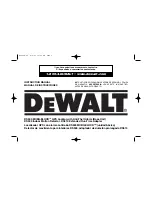
GAMEWELL-FCI
12 Clintonville Road, Northford, CT 06472-1610 USA • Tel: (203) 484-7161 • Fax: (203) 484-7118
9020-0584 Rev. C page 2 of 2
www.gamewell-fci.com
Figure 1
Mounting
•
On a 4 inch square box with or without plaster ring or
supplied adapter. Minimum depth 1.5 inches
•
On a 3.5 or 4 inch octagonal box. Minimum depth 1.5
inches
•
On a single gang box. Min. depth 1.5 inches
Installation
Place the detector into the detector base. Turn the detec-
tor clockwise until the detector locks into place.
To use the tamper-proof feature, break the smaller tab on
the scribed line in the tamper proof tab located on the
detector mounting bracket. Install the detector. To remove
the detector from the base when using the tamper-proof
feature, insert the blade of a small screwdriver into the
hole on the side of the base and push the plastic lever
away from the detector head. This will allow the detector to
be rotated counterclockwise for removal.
Note: The decorative ring must be removed in order to
remove the head when using the tamper-proof feature.
The tamper-proof feature may be defeated permanently by
breaking the plastic lever off the base
Note: The number of two-wire smoke detectors which can
be accommodated per zone varies with different control
panels. Consult the control panel instruction manual to
determine the capacity.
Refer to NFPA 72, Chapter 5-3, “Smoke Sensing Fire
Detectors” for spacing, location of detectors and other
guidelines.
Testing
Detectors may be tested in the following ways:
•
Place a test magnet against the cover opposite the test
module socket. (See illustration). The detector should
go into alarm within 5 seconds.
•
Field metering of detector sensitivity may be performed
with the aid of a voltmeter and Test Kit MOD 400R. For
the complete procedure, refer to the Installation and
Maintenance Instructions furnished with each detector.
Maintenance
Cleaning programs should be adapted to the individual
environment. We recommend at least, an annual cleaning
of the unit. The detector screen and cover assembly can
be removed, revealing the sensing chamber. A vacuum
cleaner can be used to remove dust from the screen,
cover and sensing chamber. For the complete procedure,
refer to the Installation and Maintenance Instructions fur-
nished with each detector.
WARNING:
To prevent detector contamination during con-
struction, smoke detectors must be protected from dust
and contamination until the area is clean and dust free. see
NFPA 72 -5-3.7.1.3.
Ordering Information
Part Number
Description
1451
Ionization Detector
Alarm Current
‡
B401B
Base, two-wire
Supervisory
Current
00012 A
Alarm Current
‡
B402B
Base, four-wire, 24 VDC operation
Supervisory
.00012 A
Current
.036 A
Contacts
Form A, C*
B404B
Base, four-wire, 120 VAC operation
Contacts
Form A, C* & Supvervisory
RA-400
Remote alarm indicator
Alarm Current
.007 A
PAM-1
End-of-line relay, 24 VDC
Alarm Current
.015 A
Contacts
Form B Test kit
*Resistive load
(Contact
Ratings):
Form A - 2.0 A @ 30 VAC/DC
Form C - 2.0 A @ 30 VAC/DC, 1.0 A
@ 120 VAC
‡Note: Alarm current of detector is limited by control panel
initiating device circuit.
L O C K P R O N G
R E M O V A B L E
S C R E E N
R E M O V A B L E
C O V E R F O R
C L E A N IN G
V ie w s S h o w P o s itio n o f T e s t M a g n e t
R E C E S S E D
T E S T S W IT C H
T A M P E R
S L O T
L E D
T E S T M O D U L E
S O C K E T
P U S H R E C E S S E D
S W IT C H W IT H A 0 .1 "
M A X . D IA M E T E R
T O O L




















